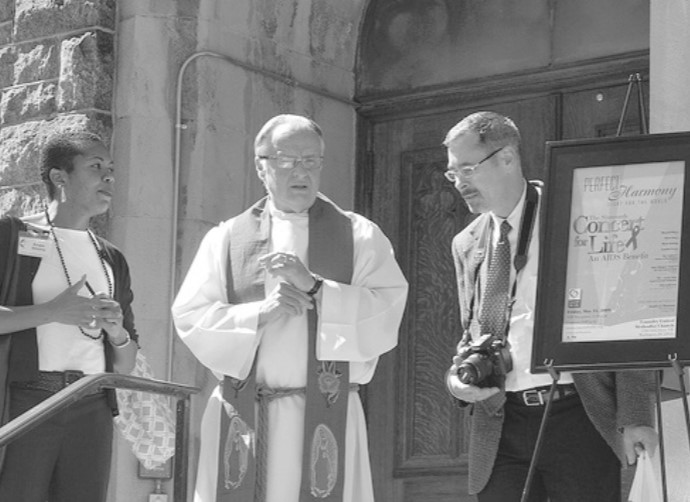What difference can one church make when confronting a complex issue such as homelessness? Street Sense co-founder and board member Ted Henson recently interviewed Senior Minister Dean Snyder of Foundry United Methodist Church to find out.
The Church, located just a few blocks from the White House on 16th Street NW has been active in social issues in the District and around the world for more than 185 years. Mission work includes not only fighting to end homelessness teaching English to immigrants, giving prisoners books to read, helping to rebuild the hurricane-ravaged Gulf Coast and cooking meals for Washingtonians with HIV/AIDS.
Henson: Foundry United Methodist Church is sponsoring an “Ending Homelessness Sunday” on October 24. Can you tell our readers what the genesis for this was and what your expectations are for the day-long event?
Snyder: A few years ago we were wrestling with how to respond to the people who sleep on our church steps at night. People living in condos and houses nearby were complaining. Our minister of mission Jana Meyer talked to other churches and the Washington Interfaith Network to explore what churches in other cities were doing. In 2007, a group of churches from WIN, as well as the Committee to Save Franklin Shelter and city government officials, took a trip to New York City to visit Rosanne Haggerty and Common Ground whose goals wasn’t just more shelters.
Their goal was to end homelessness. We decided the best way to respond to the complaints about people sleeping on our church steps was to work with other churches and organizations in Washington to end homelessness.
H: What do you see as the faith-based community’s role in solving homelessness and poverty?
S: Congregations have always been part of the network of services that sustain people. Foundry continues to help meet people survival needs through our homeless walk-in mission. We help with clothes and referrals and help people get official ID. We make sandwiches to be distributed on the streets. We volunteer with other organizations providing basic services. All this is important. But changing systems and finding lasting solutions is also critical work that congregations need to be doing. It is just as important to make sure elected officials rebuild safety nets as it is to be a small part of the safety net.
H: Foundry is an active member of the Washington Interfaith Network. Can you talk a bit about how WIN has mobilized around the issue of homelessness in recent years? Specifically, what are some of WIN’s successes.
S: Along with many other groups working on this issue in the city, WIN has sought to build political will for ending homelessness in Washington D.C. Following the trip to New York to visit Common Ground, permanent supportive housing became a key part of WIN’s citywide agenda.
In July 2007, WIN secured a public commitment from Mayor Fenty to implement the Homeless No More plan including 2,500 units of permanent supportive housing by 2014. The following year, in April of 2008, WIN secured public commitments from both Mayor Fenty and City Councilmembers at two separate actions to commit 19.2 million for permanent supportive housing for fiscal year 2009.
That summer WIN leaders participated in three nights of vulnerability assessments of people on the streets, based on the Common Ground model. In 2009, with a very changed political climate, funding was flat for fiscal year 2010 for permanent supportive housing. WIN mobilized along with other groups to restore $17 million in federal funds for new Housing First units for Washington D.C. The economic crisis has made the task of ending homelessness enormously more challenging, particularly for homeless families. At the same time, this summer DHS announced that 1,000 people have been housed through permanent supportive housing for Washington D.C., which represents a victory for this entire city.
H: In your preaching, you often talk about homelessness. What is your personal connection to the issue?
S: I was a pastor in Philadelphia in the mid-late 1970s when economic forces and new governmental policies created the kind of homelessness we are experiencing today. The America I grew up in did not have people panhandling in the streets or sleeping on park benches and church steps. When I saw people begin sleeping in parks and begging on our streets, I couldn’t believe it.
Deinstitutionalization and a Draconian cut in human services for the most vulnerable created homelessness, and it happened so suddenly and in such numbers that social services and churches were just overwhelmed. A church I was serving in the late ‘70s and for much of the ‘80s began the first shelter for families in Philadelphia. We thought our shelter was a stop-gap effort, but homelessness just kept growing and growing. Most painfully, some of the people we worked with suffered mental illnesses or other disabilities.
An unbelievable number were veterans with war experiences. A decent society doesn’t allow this to happen. It doesn’t allow people with health problems and shock from war experiences to live on its streets. It doesn’t relegate them to shelter beds. My biggest personal problem is that I became hopeless. I stopped believing that homelessness could be stopped until people like Roseanne Haggerty birthed a new vision of ending homelessness.
H: Oftentimes Christians are defined for their stances on controversial social issues such as homosexuality and abortion, mostly by their opposition. In recent years, there has been a renewed emphasis on the biblical emphasis on fighting poverty. This is evidenced by the likes of Shane Claiborne, Jim Wallis, and the new monasticism movement. Where do you think the church should be focusing its time and energy in relation to this dichotomy, if in fact a dichotomy exists
S: Whatever their views on controversial issues like abortion and homosexuality, I suspect no church has much credibility unless it is actively involved in ministering with poor people. Every religion teaches justice and equality, including economic justice. Certainly Christ taught that our lives will be judged by whether we feed the hungry and clothed the poor.
H: Isn’t the goal of ending chronic homelessness by 2014 unrealistic given the current status of the economy?
S: No. Ultimately the cost of permanent supportive housing could be not much greater than the cost of running large shelters (where some people in effect live for years) and other costs such as emergency room health care. Making the change from the way we have been doing things, however, will require discipline, consistency, and citizens who help the city maintain the political will to do things differently. Ending homelessness in Washington, D.C., by 2014 is possible if we really want to see it happen.








